Key takeaways:
- Underground music culture offers an authentic community experience, encouraging deep emotional connections and personal expressions beyond the commercial music industry.
- Discovering underground bands online can involve various social media platforms, facilitating connections through music sharing and collaborative playlists.
- Attending intimate underground music events fosters real interactions with artists and passionate audiences, creating an electrifying atmosphere often absent in mainstream settings.
- Promoting underground bands effectively involves storytelling and community engagement, enhancing their visibility and connecting diverse music lovers.
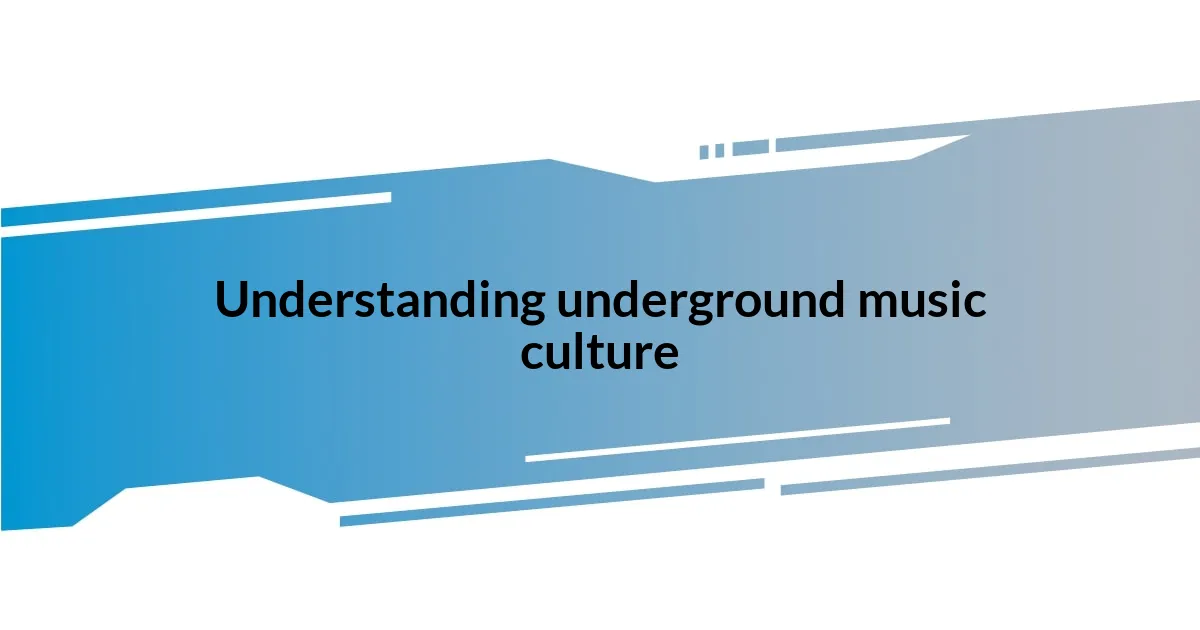
Understanding underground music culture
Diving into underground music culture reveals a realm pulsing with raw creativity and authenticity. I remember my first experience at a local DIY venue, surrounded by passionate fans who truly understood the depth of the music. That night, as the band played, I felt an electric connection with everyone in the room—there was no judgment, just pure expression.
It’s fascinating to consider how underground music often serves as a refuge for those seeking authenticity in a commercially driven industry. Have you ever wondered what draws people to these small, gritty clubs instead of mainstream concerts? For me, it’s the feeling of being part of something special, where every note and lyric resonates with shared struggles and aspirations, creating a community bound by a mutual appreciation for artistry.
Emotions run high in these spaces, often fueled by a powerful drive to challenge societal norms. I’ve walked away from countless shows feeling invigorated and inspired, as though I had witnessed something truly revolutionary. In those moments, you realize that underground music is not just a genre; it’s a movement that mirrors the passions, hardships, and triumphs of those who feel overlooked in the mainstream.
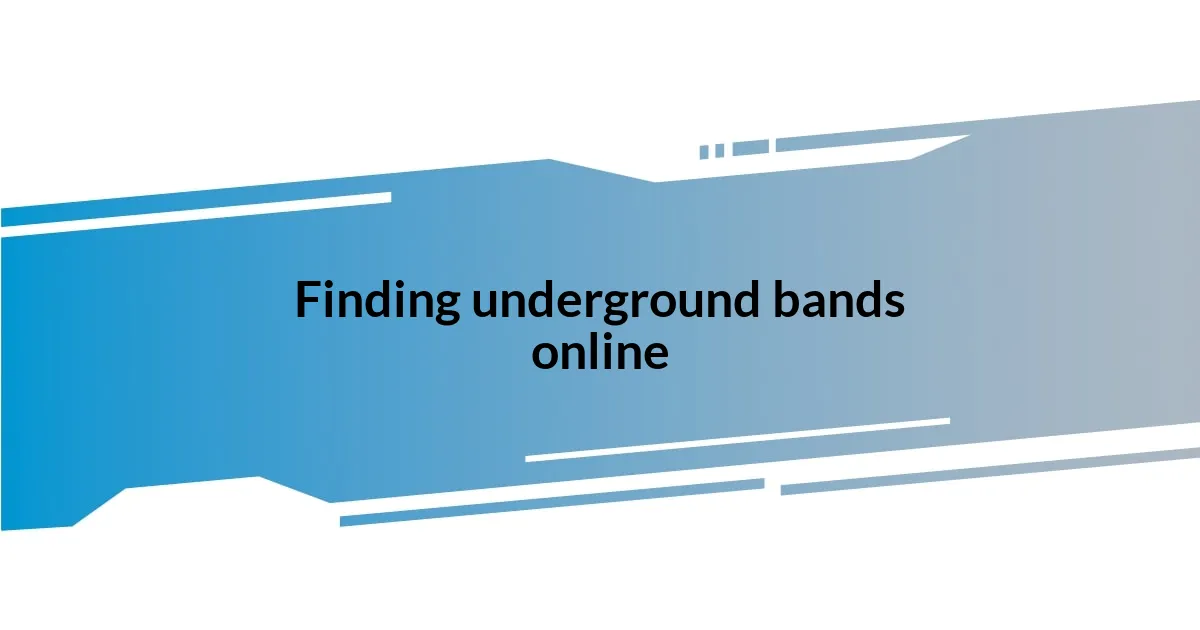
Finding underground bands online
Finding underground bands online can be an exciting journey. I often start my search on social media platforms, where artists share their latest tracks and connect with fans. Just the other day, I stumbled upon a gem of a band through a friend’s Instagram story, a reminder of how word-of-mouth can lead you to hidden musical treasures.
Here are some effective ways to discover underground bands online:
– Bandcamp: Many artists release their music here, allowing you to explore various genres and even directly support them.
– SoundCloud: This is a goldmine for independent artists, featuring everything from demos to polished tracks.
– YouTube: Check out live sessions and music videos to get a feel for the band’s energy.
– Reddit: Subreddits like r/indieheads or r/music can introduce you to new artists and underground scenes.
– Spotify Playlists: Look for playlists curated specifically for underground music; you’ll often find unique sounds that aren’t mainstream.
When you dive deep into these platforms, it’s like embarking on a treasure hunt. I recall finding a band whose sound felt personal—almost as if their music was narrating my own experiences. Those moments remind me of the power of underground music to resonate on such a profound level.
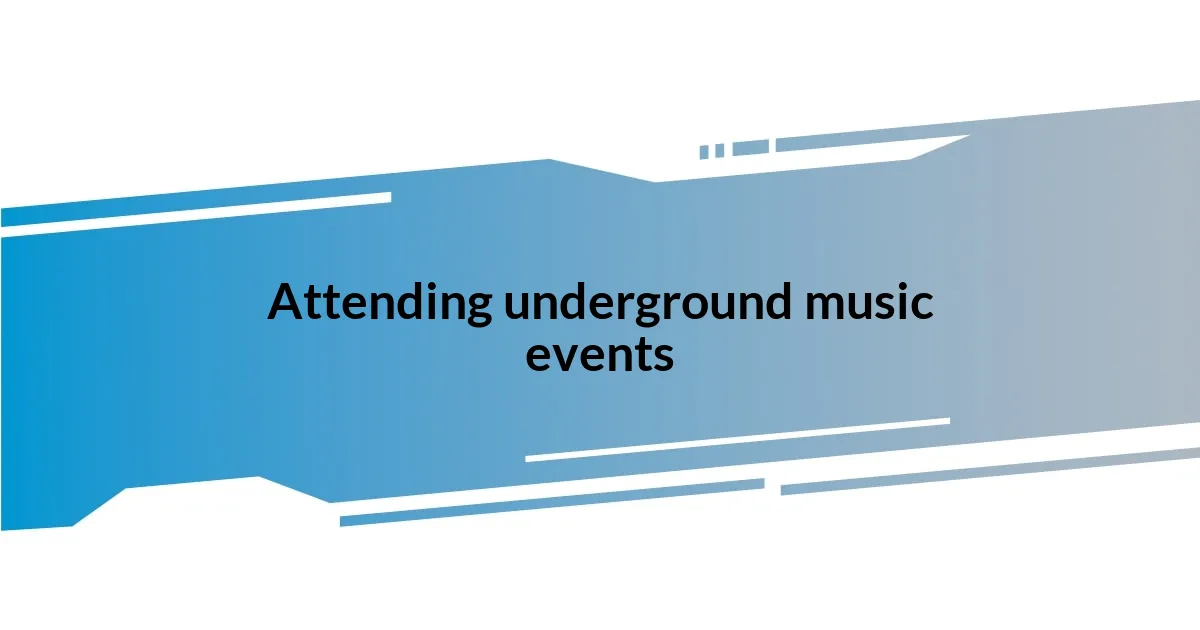
Attending underground music events
Attending underground music events is an experience unlike any other. I vividly remember the palpable excitement in the air at a recent show, where a small crowd filled a cozy basement venue. The dim light flickered as the band took the stage, and I found myself swept up in the collective anticipation of everyone around me. It’s this intimate atmosphere that allows for spontaneous, genuine moments that don’t often happen at larger concerts.
Another aspect that makes these events special is the connection to the artists. Unlike mainstream shows, where you might feel like just another face in the crowd, here, you can often chat with the musicians post-show. On one occasion, after a blistering set, I struck up a conversation with a bassist who shared stories about their creative process. That conversation added another layer to my appreciation for their music, and I walked away feeling like I had gained insight into both the band and the underground scene.
While attending these events, you might notice a surprising contrast between the energy of the crowd and that of commercial music venues. Often, the audience is comprised of die-hard fans who are not just there for a night out but to support the art itself. I distinctly recall a particularly loud cheer when a band played a song that wasn’t even on their latest album—proof that underground music is about love and loyalty as much as it is about sound.
| Aspect | Underground Events |
|---|---|
| Connection | Intimate and authentic |
| Artist Interaction | Accessible and personal |
| Audience Energy | Passionate and engaged |
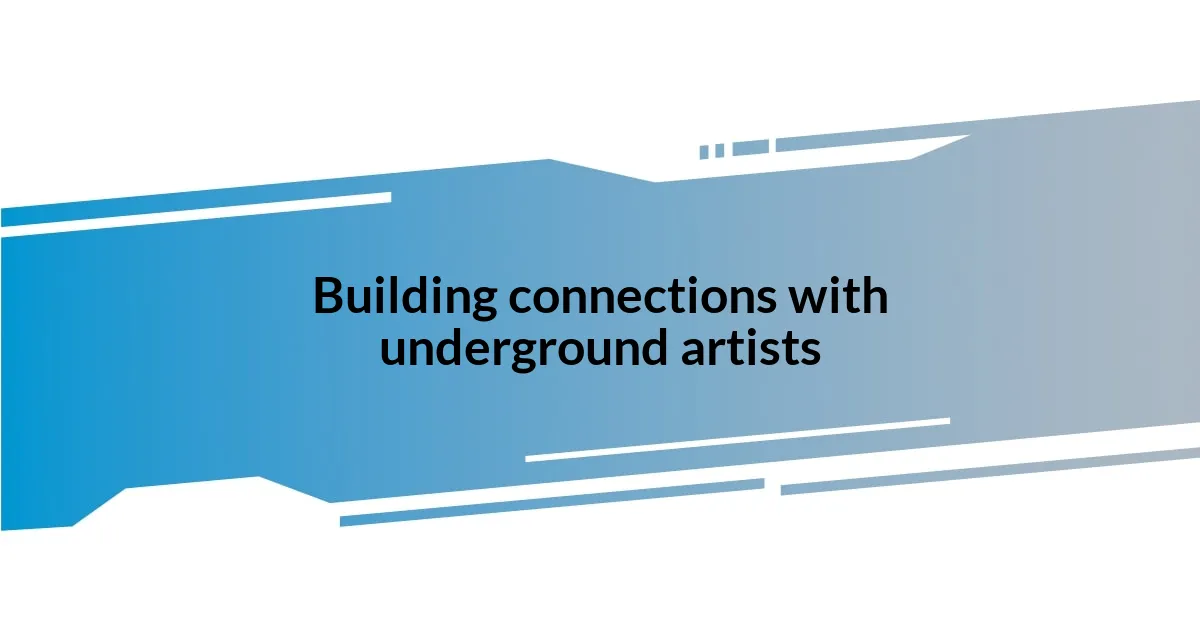
Building connections with underground artists
Building connections with underground artists is a rewarding part of this journey. I remember the first time I reached out to an artist I discovered online. They were just starting out, and I sent them a message expressing how much their music resonated with me. To my surprise, they responded quickly, sharing stories about their songwriting process, which felt like sharing a secret. That interaction opened my eyes to the personal side of artistry—these musicians often crave genuine engagement with their audience.
Connecting with underground artists isn’t just about sending messages; it’s also about being present in their world. At a recent local show, I noticed a band I loved was playing in my area. After their set, I took the leap to introduce myself. It turned into a heartfelt exchange where the lead singer revealed how their lyrics were inspired by real-life struggles. I found myself reflecting on how sharing those experiences can build a relationship that goes beyond just a fan-artist dynamic. Have you ever felt that spark of connection with an artist? It’s truly inspiring.
Support also plays a significant role in these connections. I often purchase merchandise directly from the bands after a show. One time, I bought a handmade vinyl from a group that toured in a friend’s van. The excitement they exhibited when making sales was infectious, and I felt a sense of pride in supporting their craft. Every purchase, every share on social media feels like a small but meaningful way to tell these artists, “I see you.” How powerful is that in a world dominated by mainstream fame? It’s about building a community that celebrates the art, not just the artist.
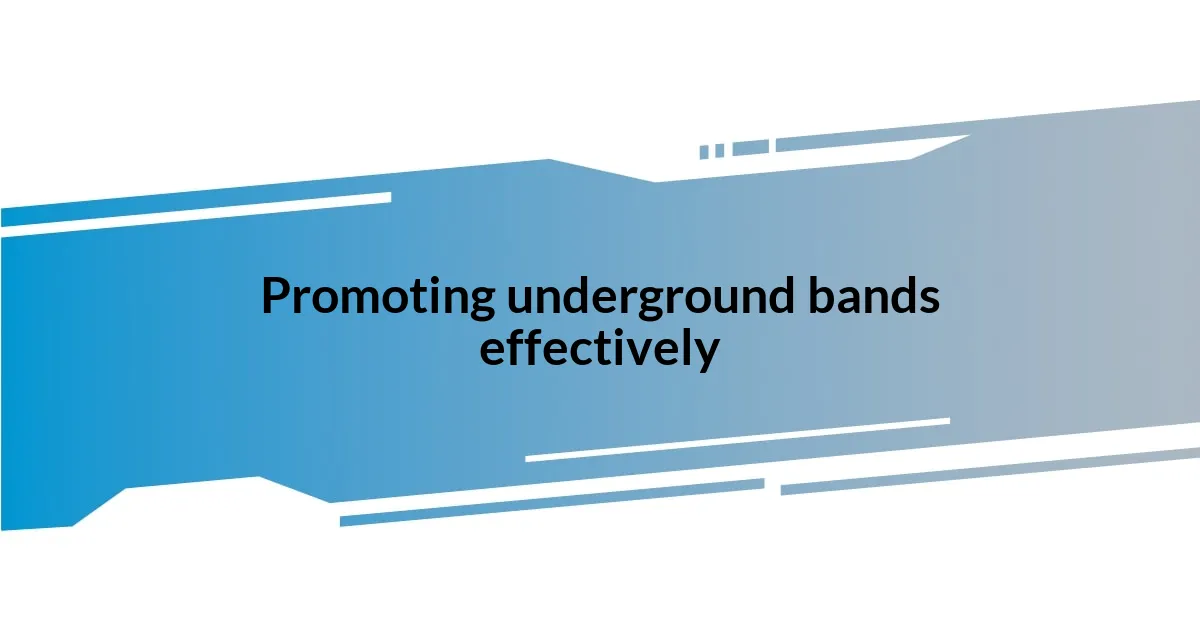
Promoting underground bands effectively
Promoting underground bands effectively requires a multi-faceted approach that resonates with the core of what makes them unique. I recall attending a local showcase where several budding artists performed back-to-back. The magic wasn’t just in the music; it was also in how the organizers created an online buzz through social media. They shared behind-the-scenes content, artist interviews, and even teaser clips of the live performances. This blend of storytelling and marketing not only captured attention but also fostered a sense of community around the musicians.
One of my favorite strategies for promoting bands I love is leveraging collaborative playlists. I once curated a mix featuring underground tracks alongside mainstream favorites, which drew in friends who typically gravitate toward more commercial sounds. I was amazed at how their perception shifted—they discovered new talent and embraced the freshness of the underground scene. It made me consider: how often do we explore music outside of our comfort zone? Featuring underground bands in playlist rotations can create bridges between different music lovers, amplifying their reach.
As for live performances, I’ve seen extraordinary things happen with the right promotion. At one local venue, a relatively unknown band took the stage after word spread online about their unique sound. The room was packed, and I noticed how the energy shifted as people connected over the music. It felt electric. It dawned on me that promoting underground acts can sometimes just mean creating opportunities for people to experience their artistry firsthand. What if everyone who loves music could tap into that feeling? It’s all about building that excitement and connection that makes underground music so special.
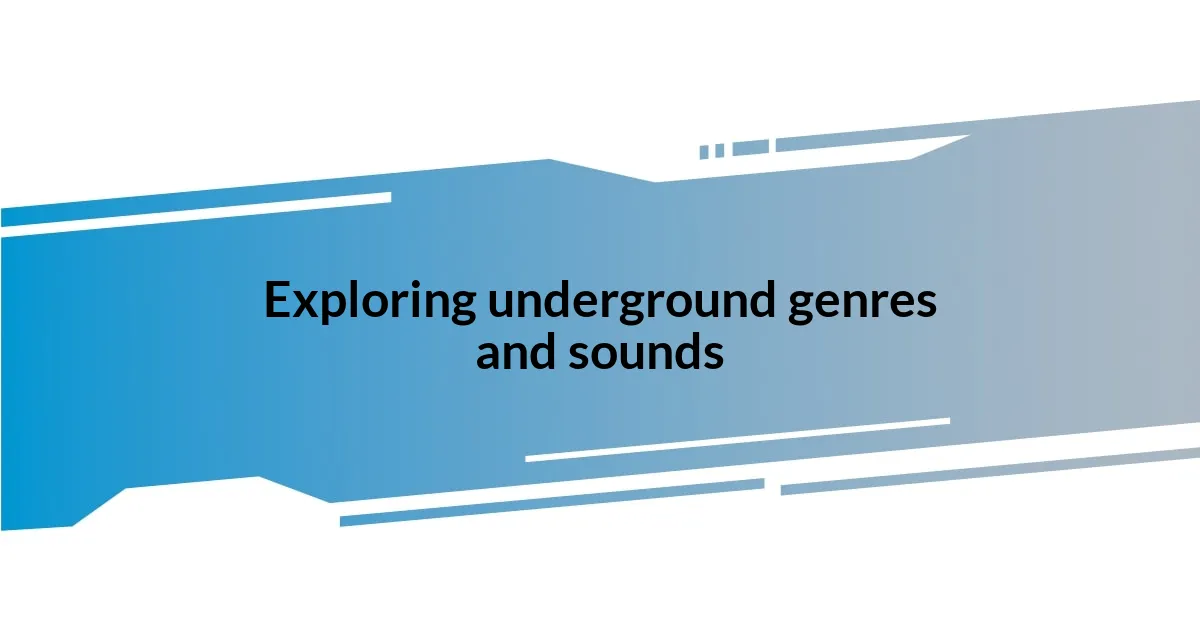
Exploring underground genres and sounds
Exploring the underground genres of music has its own unique charm. I recall stumbling upon a garage rock band at a small festival. Their raw energy and unrefined sound were refreshing compared to formulaic mainstream music. I found myself wondering: how is it that something so unpolished can feel so authentic? There’s a freedom in underground music that often resonates deeply, echoing real-life struggles and collective emotions.
As I delved deeper, I discovered the richly diverse world of underground hip-hop, where lyricism takes center stage. I remember attending an intimate open mic night, where local artists shared their stories through verses. The atmosphere was charged with creativity—each line unfolded a different narrative that felt relatable yet intricate. It hit me how underground genres often provide a platform for marginalized voices, enabling artists to express their truths. Isn’t it powerful to witness such vulnerability and courage from musicians who might not get the spotlight they deserve?
Folk-punk is another genre that caught me off guard during my explorations. One evening, I joined a cozy gathering at a community center, where artists strummed acoustic guitars and sang songs about social issues. The connection among the audience was palpable. I felt like part of a movement—each song evoked nostalgia and sparked conversations. It makes me think, how often do we find ourselves in spaces where music serves as the backdrop for change? That is what underground sounds create: a space for growth, reflection, and connection among people.